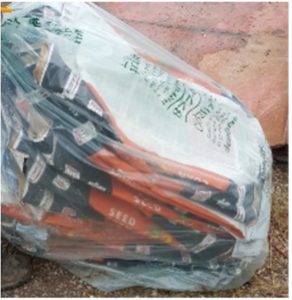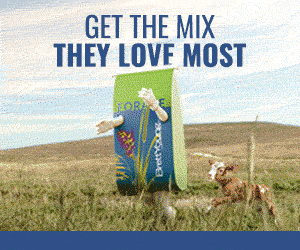AB Direct - Steers
Rail: 518.50-528.50 FOB feedlot (last week)
AB Direct - Heifers
Rail: 518.50-528.50 FOB feedlot (last week)
US Trade- Steers
Rail: 388.00 (NE, IA) last week
US Trade - Heifers
Rail: 388.00 (NE, IA) last week
Canadian Dollar
0.01

It’s official – seed, pesticide, and inoculant bag recycling is here to stay!
For several years, Prairie farmers have been keenly participating in Cleanfarms’ seed, pesticide, and inoculant (SPI) bag recycling pilot project in search of more environmentally friendly alternatives for managing these items once empty. Starting in 2023, Cleanfarms is pleased to announce that SPI bag recycling is launching across the prairies as a full-time permanent program – just in time for the seeding season!
This means Alberta farmers will have more opportunities to prepare and bring their empty SPI bags to a nearby Cleanfarms collection site. For more information about the program, visit the Cleanfarms SPI Webpage.
In Alberta, over 140 retail collection sites currently accept empty bags and tote bags for seeds, pesticides, and inoculants, and that number keeps growing. Specifically, the program accepts:
· Small bags up to 100 kg
· Plastic bladders/bags for inoculants
· Bulk bags (tote bags/mini-bulk bags/super sacks) larger than 100 kg; usually 500 kg or 1,000 kg

To find out where to drop off prepared empty SPI bags, visit the online Cleanfarms collection site map.
Cleanfarms programs are all designed with one primary goal in mind: to help farmers manage used agricultural plastics materials on the farm in the most sustainable way possible through recycling and safe disposal. For example, bulk SPI bags are sent for recycling to be turned into lumber wrap or mixed with other plastics in manufacturing new car parts. Small SPI bags are sent to specialized cement kilns in North America to be used as a low-carbon fuel source since they are made from laminated paper and plastic. Because these layers are fused together, they are hard to recycle. More details on how the products are recycled and where are available on the Cleanfarms ’What Becomes What’ page.
Each Cleanfarms program has specific preparation instructions to protect the environment and to be manageable for collection site staff and program partners. Farmers who have participated in the widely used Prairie SPI pilot program will already be familiar with the preparation steps required to drop off empty bags:
Small SPI bags (up to 100 kg)
· Pick up Cleanfarms ag-collection bags free of charge from your seed dealer or ag retailer when you purchase products.
· Ensure SPI bags are completely empty but avoid shaking them to avoid dust.
· Fill an ag-collection bag with 40-50 empty SPI bags, then tie securely with rope, twine, or a zip tie.
· Return full ag-collection bags to a participating retailer – at no charge.
Large SPI tote bags (i.e. bulk bags, mini-bulk bags and super sacks)
· Where possible, remove plastic liners if present, and place them in a separate ag-collection bag or combine with the small SPI bags.
· Stack the large tote bags in bundles of five or six and roll or fold them together and secure them with rope or twine.
· Return bundles of large tote bags and ag-collection bags of removed liners to a Cleanfarms collection site – at no charge.
Cleanfarms’ Executive Director, Barry Friesen, shared his thoughts on the high level of participation from growers, collection site staff, and contractors that has propelled the SPI pilot into a fully-fledged permanent program. “Prairie farmers have done a great job returning empty SPI bags through this pilot, and we’re excited to see it transition into a permanent program. Cleanfarms will continue working to increase opportunities for farmers to manage their ag plastic in harmony with the environment.”
Cleanfarms is grateful for the commitment demonstrated by Alberta farmers to uphold good land stewardship practices, and so happy to be able to provide SPI bag recycling solutions on a permanent basis. We look forward to working together with growers to continue diverting ag plastics away from landfill.
Cleanfarms and the Alberta Agricultural Plastics Recycling Group (APRG) are publishing a series of information articles for Alberta farmers to develop a shared understanding of the importance of used agricultural plastics resource management.
A common theme throughout this monthly series is an exploration of how ag plastics, once used, can be recycled to reclaim the natural resources and the invested energy, returning them to the economy where they can be remanufactured into new products.
This practice is important to Alberta farmers because it contributes to agricultural sustainability that begins and ends on the farm, providing stewardship for future generations, as well as environmental health. Future articles will feature discussions on change management such as first sellers and manufacturers taking responsibility for used materials (extended producer responsibility), and explore practical recycling, including opportunities and challenges, for products such as grain bags, silage and bale wrap and baler twine that have real-time applications for farmers.
Cleanfarms is operating a three-year pilot project for grain bag and baler twine recycling in Alberta. The project is led by the multi-stakeholder APRG. Funds were granted by the Government of Alberta and are being administered by Alberta Beef Producers.
Find out more:

